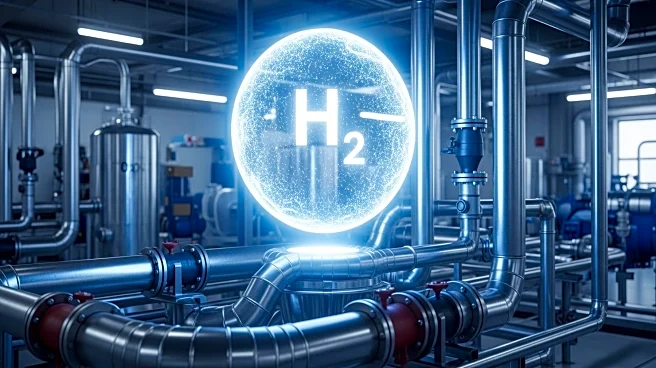What's Happening?
Utility Global, a Houston-based company, has developed a new technology for producing clean hydrogen without relying on traditional color classifications. The company's H2Gen system utilizes waste gases from industrial sources, such as steel mills and methane-rich biogas from landfills, to drive the hydrogen production process. This approach eliminates the need for external electricity, making the process more energy-efficient and potentially reducing environmental liabilities. The system captures concentrated CO2 emissions, which are easier and cheaper to sequester than dispersed emissions. The technology is being tested in Brazil and Korea, with promising results in transforming industrial byproducts into clean hydrogen fuel.
Why It's Important?
The development of Utility Global's H2Gen system represents a significant advancement in the hydrogen industry, offering a more sustainable and cost-effective method of hydrogen production. By utilizing waste gases, the technology not only produces clean hydrogen but also mitigates the environmental impact of industrial emissions. This approach could lead to a reduction in greenhouse gas emissions, particularly methane, which is a potent contributor to climate change. The system's ability to produce hydrogen with potentially negative carbon intensity could make it cleaner than traditional green hydrogen, providing a practical solution for industries seeking to decarbonize without extensive infrastructure changes.
What's Next?
Utility Global's technology is currently undergoing testing in Brazil and Korea, with the potential to scale across global steel industry operations and wastewater treatment facilities. The success of these projects could demonstrate the feasibility of waste-to-hydrogen technology on a larger scale, encouraging more industries to adopt similar methods for reducing emissions. As the hydrogen industry continues to evolve, Utility Global's approach may challenge the existing color-coded classifications, prompting a shift towards more nuanced and practical decarbonization strategies.
Beyond the Headlines
The implications of Utility Global's technology extend beyond immediate environmental benefits. The system's reliance on waste gases highlights the importance of industrial automation and precision engineering in maintaining efficient and low-carbon hydrogen production. The partnership with Rockwell Automation underscores the role of advanced control systems in ensuring the process remains sustainable. This development may also influence policy discussions around renewable energy subsidies, as industries explore alternative methods for achieving carbon neutrality.










